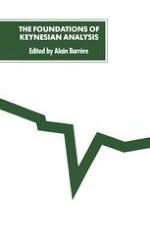1988 | OriginalPaper | Chapter
The Role of Effective Demand in the Short Run and the Long Run
Author : Lord Kaldor
Published in: The Foundations of Keynesian Analysis
Publisher: Palgrave Macmillan UK
Included in: Professional Book Archive
Activate our intelligent search to find suitable subject content or patents.
Select sections of text to find matching patents with Artificial Intelligence. powered by
Select sections of text to find additional relevant content using AI-assisted search. powered by
The core of Keynesian theory can be summed up in two propositions. The first is that in a capitalist economy the level of production in general is not determined by the availability of resources but by effective demand which determines how much of potential resources are effectively utilised. The second is that demand is the sum of two components: an endogeneous component which varies in proportion to the costs incurred by entrepreneurs (which constitute the incomes of wage and salary earners), and an exogenous component which is financed out of capital — by borrowing, or by the sale of financial assets, which comes to the same thing — and which Keynes treated as a given factor in the short period, determined by expectations. The principle of effective demand asserts that there is an equilibrium level of output (or employment) at which the proceeds of entrepreneurs (as a group) are neither greater nor less than the proceeds the expectation of which is the necessary inducement to cause them (the entrepreneurs) to incur expenses on the scale required to produce that output. If we call the latter the ‘aggregate supply price’ (ASP) (consisting both of the costs incurred on hiring labour etc., and the profits necessary to induce entrepreneurs for incurring costs on that particular scale), the equilibrium level of output will be that at which the sum of endogenous (D1) and exogenous (D2) demand (which could be termed as the ‘aggregate demand price’, ADP ≡ D1 + D2) is equal to ASP.
